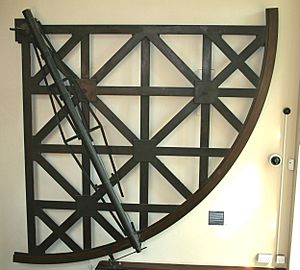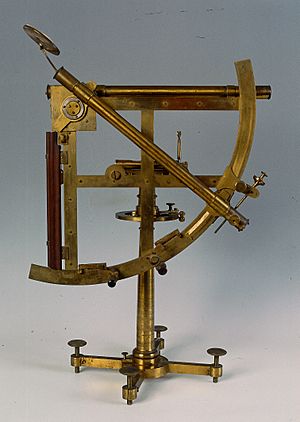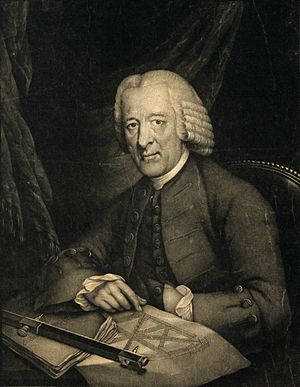John Bird (astronomer) facts for kids
John Bird (1709–1776) was a very skilled British maker of mathematical instruments. These were special tools used for measuring and observing, especially in astronomy. He was born in a place called Bishop Auckland.
He moved to London in 1740. There, he worked for other famous instrument makers like Jonathan Sisson and George Graham. By 1745, he had opened his own business in an area of London called the Strand.
Contents
John Bird's Amazing Instruments
John Bird became famous for making very accurate instruments. His work was crucial for astronomers and scientists of his time.
The Giant Quadrant at Greenwich
One of John Bird's most important projects was making a huge brass quadrant. A quadrant is a tool shaped like a quarter-circle, used to measure angles and the positions of stars. This particular quadrant was 8 feet (about 2.4 meters) across!
It was made for the Royal Observatory at Greenwich. This observatory is a famous place where astronomers study the sky. The quadrant was set up there on February 16, 1750, and you can still see it today.
Soon after, other countries wanted their own copies of this amazing instrument. France, Spain, and Russia all ordered duplicates from John Bird.

Instruments for James Bradley
John Bird also made many high-quality instruments for the astronomer James Bradley. These tools were so good that a special group called the "commissioners of longitude" paid John Bird £500. This was a huge amount of money back then!
They gave him this money on one condition: he had to take on a student for seven years. He also had to write down exactly how he made his instruments. This was to make sure his amazing skills and methods could be passed on to others.
Bird's Important Books
Because of the agreement with the commissioners, John Bird wrote two important books. These books explained his detailed working methods.
- The Method of Dividing Mathematical Instruments (1767)
- The Method of Constructing Mural Quadrants (1768)
Both books had an introduction written by the astronomer-royal, Nevil Maskelyne. These books helped other instrument makers learn from Bird's precise techniques.
Legacy and Impact
John Bird's work had a lasting impact. He helped set new standards for accuracy in scientific instruments.
Sadly, two standard yard measuring rods that Bird had made in 1758 and 1760 were destroyed. This happened when the Houses of Parliament burned down in 1834.
John Bird is even mentioned in a famous novel! He appears with his friend William Emerson in Mason & Dixon, a well-known book by Thomas Pynchon.
 | Bessie Coleman |
 | Spann Watson |
 | Jill E. Brown |
 | Sherman W. White |



